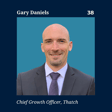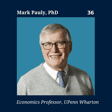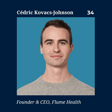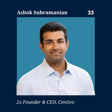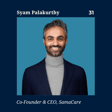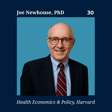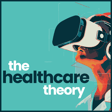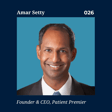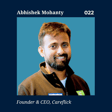Introduction and Erica Jain's Background
00:00:00
Speaker
Welcome to the Healthcare Theory Podcast. I'm your host, Nikhil Reddy, and every week we interview the entrepreneurs and thought leaders behind the future of healthcare care to see what's gone wrong with our system and how we can fix it.
00:00:15
Speaker
So today we're going to be speaking with Erica Jain, the founder of Healthy. Healthy is a New York-based software company that provides a platform to enable telehealth and virtual care. So thank you so much, Erica, for coming on today.
00:00:26
Speaker
Super excited to have you. Thank you so much for having me. Of course. And I'm really interested to get into healthy. But before we get into that, we'd love to hear your background. What kind of brought you into health care?
00:00:38
Speaker
Absolutely. I have been interested in health care for as long as I can remember. um That took shape in college where I created my own major in international health disparities.
00:00:49
Speaker
um I wanted to see what the business of health care was like. So I went over to bcg after college to do health care consulting. My heart has always been a nonprofit. So I also spent some time at the Clinton Health Access Initiative working on a global and amount nutrition project.
Founding of Healthy and Initial Challenges
00:01:09
Speaker
But we started the company about nine years ago because I had watched my parents go through the process of working with the corporate wellness team. And over the course of about a year, ah they both lost 35 pounds. And I saw that and I really said, well, this is what healthcare care should look like.
00:01:28
Speaker
um This is what the patient experience should feel like this is what, I mean, candidly, the consumer experience should feel like of enabling people to live better, healthier lives and make good judgment decisions.
00:01:41
Speaker
And so I started digging into um this space a bit and my co-founder and i we just started talking to any provider that would talk to us.
00:01:52
Speaker
And It really turns out that unfortunately in our healthcare system, which it has layers and layers and layers of complexity, most technology and most services had been designed to optimize medical billing, um optimize reimbursement codes, and also focus on healthcare care that was one time in-person only, ah physician only care that was ultimately very, very reactive and procedure based because again, that's how medical billing works in this country overall.
Evolution and Expansion of Healthy's Services
00:02:31
Speaker
And so we set out to um create a platform that would allow our providers who are the therapists, the dieticians,
00:02:43
Speaker
the doulas, the physical therapists, the nurses who are often working with their patients for months and years at a time with the tools that they needed to deliver care. And that was really the origin story for for Healthy as well.
00:02:59
Speaker
Yeah. And that's great to hear. But I mean, kind of curious, you had those initial conversations. Like, how did you kind of approach those? Were you kind of casting a wide net, like speaking to people across different segments? Or was it all like a very specific vertical within healthcare? care What kind of led you to realize that virtual care is kind of going to be the future?
00:03:15
Speaker
That's a great question. So Healthy started off as a practice management platform for dietitians and coaches. So we talked to, and then you'll realize very quickly that it's ultimately about um types of care supported, and that's really the underlying pillar across everybody that we work with today.
00:03:35
Speaker
Um, but we started in the field of dietetics and coaching. And what's beautiful about that is that when you think about the type of care that dietitians and coaches are providing, it's long-term dietitian and health care. You don't lose weight or reach your health goals by working with a dietitian once it's over the course of months and years.
00:03:53
Speaker
Um, there's an element of in-person and virtual, what's everyone it's, it's as, pick it can be as simple as you went viewing a document, signing an intake form, um joining a a virtual ah telehealth session, um all the way to never actually meeting your provider in person ever, and all of the A-state care that comes along with that, um integrating with wearables and Fitbit. But you think about like what's really, really cool and what's happened with the healthcare care system over the past nine years since we got started is that more and more healthcare is looking like how dietitians have practiced for years, which is really good for healthcare outcomes because it means that...
00:04:32
Speaker
um Patients are getting healthcare the way it should be delivered, which is proactive, personalized, preventative. And there's so much technology that is enabling and feeding into that, but it's really, really amazing and overdue to see the amount of healthcare innovation.
00:04:48
Speaker
Yeah, I think it's definitely going to pretty big shift we're seeing is that really is a big focus on making sure there's a single point of care for patients and they kind of know where to go and have that consistent long term horizon, especially behavioral health.
Building Healthy: Iterative Process and Integration
00:05:00
Speaker
um And yeah, of course, what you touched on, but was curious, was this like, was there some hesitation when you explained the solution to providers? Were they hesitant, were they kind of worried that the quality of care would drop off? Or do you think there was always a very strong demand for the solution?
00:05:17
Speaker
oh, this is what consumers have been wanting and demanding from the healthcare system. I think unfortunately for so long, you think about like access to mental healthcare, access to nutritional care, access to to doulas and lactation consultants. It's been so fragmented, so overlooked.
00:05:38
Speaker
Insurance reimbursement for these really important services is finally starting to emerge, but I think it's exactly what ah we as people all need to live better and healthier lives.
00:05:52
Speaker
Yeah, because I think it's especially behavioral health, we have such a supply demand issue. There's nowhere near enough psychiatrists to address the amount of people that need mental health. I mean, this is a great solution to really help integrate that and fill those gaps.
00:06:04
Speaker
But i was curious, I mean, you're kind of, when you're building a technology platform, you're often, i mean, trying to look at a long-term goal, but it's hard to build a solution around that. Like what were the kind of challenges you faced early on? Because of course, you're going to see a lot of bugs and things come up as you scale, but how'd you build a solution that's scalable?
00:06:21
Speaker
Absolutely. it's It's through a practice of constant iteration. um And my favorite part about building and software is that the platform gets better and better and better every single day when you wake up, show up and contribute to R&D process.
00:06:44
Speaker
And what people don't always understand about tech that we've learned over nine years is a lot of building out enterprise grade best in class technology is actually an exercise in time, not money in that there's a There's that saying, you you you can't there's a mythical man hour um saying and in in tech where you can't hire nine pregnant women and have a baby in one month. It's going to take time. and It's all about the right pieces fitting together in order to build and create and sustain enterprise grade technology at scale.
00:07:22
Speaker
What I have also learned is that it is really, really easy to build a V1 in software. um
Feature Development for Targeted Healthcare Needs
00:07:30
Speaker
The complexity of requirements is much less.
00:07:33
Speaker
um You can kind of build the 80-20 version. If you flash forward to Healthy today, we've got thousands of micro features. And all of those micro features across our product lines need to work incredibly well together 100.00% the time at scale with millions of people accessing the platform over a billion API calls.
00:07:59
Speaker
And that's where the magic really happens is how to and make sure that all of those features really, really, really work seamlessly at scale.
00:08:10
Speaker
um And that's the that's a large part of of scaling a technology company. And were there the kind of features ended up adding along the way? Because I can imagine each different platform segment would require different maybe features. And that's something that's, I mean, software, there's no marginal cost of scales quickly, but when you're customizing,
00:08:27
Speaker
It definitely can take more effort, but what kind of solutions and features did you end up adding as you have scaled the platform? Yeah, absolutely. So um we at Healthy, from a product and feature perspective, we have three core products that we offer to our customers, and then we've got ah marketplace. So our three core products are our EHR, our scheduling, and then our engagement suite.
00:08:50
Speaker
ah Then we've got our marketplace of all third-party integrations. We have over 70 in-county integrations with third parties. Within each of those products, there's hundreds of features that we've like built and added and improved to over time.
00:09:03
Speaker
um a really recent example is um in behavioral health, when you're doing a group webinar session, you want to have a single screen for taking notes for the entire group of participants.
00:09:20
Speaker
Great, but when it comes to billing for behavioral health, you then also need to make sure that you've got the individual addendums. So that is a feature very specific to our customer base that builds upon our core capabilities of scheduling an appointment, hosting a telehealth session, and having charting built in that then ties into all of the other workflows of a clinician.
Sustainable Growth and Quality Healthcare Delivery
00:09:45
Speaker
And then of course you think about how all of those features need to work across each other, and that's where the magic really happens. Yeah, the modularity of it. I can imagine that probably it's like a marathon, not just for me. You can't just build this overnight. So I'm glad to hear that it's definitely worked out for you.
00:10:00
Speaker
But when you had this, I mean, essentially, when you think about venture capital, they want two things, a path to profitability and growth. Was there one that you prioritized along this path? Of course, in consulting, you must have learned a pretty good view the strategy, but how did you kind of approach building is this? Was it like tech first or was it always like a path to profitability that you had in mind?
00:10:22
Speaker
Look, I'll give you a different version of this answer, which is like we at Healthy, and I do credit Kavin, my co-founder, as being the spark for this, is we've always thought about this in terms of having ultimate financial and independence so that we know that we can wake up every single day and build for our customers first and make decisions that think about our customers and put our customers front and center.
00:10:48
Speaker
And so when we think about things like, you know capital and raising capital, there's absolutely a time and place and reason to raise capital. And there is just as importantly, the right ah sources of capital for a business like, for any business, including a business like ours.
00:11:06
Speaker
And so we've been really lucky to find long-term minded investors that have backed us because they know what we're building and they know that it's a 10, 20, 30 year that company that is what healthcare deserves and is what clinicians need.
00:11:23
Speaker
And so that's what we're really, really excited about. And then we can be really, really intentional in how we want to take capital and invest capital to fuel growth and fuel product build.
00:11:34
Speaker
But we know that at the end of the day, our customers come first. um And that's been really important to our story. Healthy has been profitable for more than half of our time as a company. And that is because we put our customers front and center and we take care of and obsess over our customers. And that is our our primary focus each and every day. Yeah, because I think we we see a lot of venture capital firms really focusing on like 10x growth.
00:11:58
Speaker
They want this platform to become huge overnight. But I think what we really need to see in healthcare is like more sustainable solutions that work over the long period are constantly iterating and and just don't really have the desire to get a lot of profit quickly. So that's really great to hear. And I don't think the two are mutually exclusive. I think you can be high growth, but also do it in a way that's really responsible. And that's what we try to find the best of both worlds of it healthy, because we believe in our, and the bigger we get, the more healthcare is being delivered that we believe is quality
Team Building and Mission Alignment
00:12:31
Speaker
However, this is healthcare we cannot sacrifice quality and we cannot sacrifice, there just core principles of building in healthcare care that we also take dearly on a day-to-day basis.
00:12:44
Speaker
And of course, like part of that comes from like having a great team. I mean, as you definitely know, you must have like built a great team over time. And as you scale like more and more, I mean, of course there's more people involved, there's less maybe direct, you're not as directly involved, but how have you kind of viewed building a team and building a team that's really mission driven and aligned on these values? So as you scale, each different incremental customer still has a great experience.
00:13:05
Speaker
Yeah, absolutely. um i've I've really learned over the years that our team is genuinely the only thing that matters, right? The caliber of talent that has joined Healthy, i am awe of and I'm humbled by each and every day.
00:13:21
Speaker
we have brought together just true experts in their field who also care about our mission. And I think the two need to go hand in hand because...
00:13:32
Speaker
um That's where the grit happens. That's where resilience comes from. That's where respect comes from. That's where all of our values and all of what we think about stems from hiring incredible people who also buy into and believe in our mission. And I feel so genuinely lucky that we have that here, especially for us where you know this this is really about executing and executing quickly and with quality. So the caliber of team I'm just so impressed with.
00:14:01
Speaker
Yeah, that's definitely great to hear. And um i think that's something that every provider's value is that you have a team that like, even if they're not interfacing with you the entire time, but they have a sales team that's aligned on those values, that that's good. And have you, and also out of curiosity, I mean, you're working with a lot of these providers will have different demands. Like, is there a balance you find between providing synchronous and asynchronous care? Like what where do you see providers really leaning between those two across different segments? It's totally different across the board. And our our philosophy is we are non-prescriptive. We enable all types of healthcare. care
00:14:33
Speaker
And whether a company wants to do sync, async, combination thereof, um if they you know evolve their own business model and do more of one way versus the other, we support that all. And and we're excited to support that.
00:14:49
Speaker
Yeah, and I can definitely imagine like COVID must have been a huge driver of growth for you guys, of course. I mean, that's when you really realize that care should be virtual. People are forced to adopt virtual care and then, of course, realize the value of it. But how did your team like interact with that basically huge like secular shift on virtual care from COVID?
00:15:07
Speaker
Well, I think it's a good question. I think overnight, you know, we actually in 2016, when we got started, we had to put telehealth in a footnote and define what telehealth was because no one really knew what telehealth was in 2016 when we got started, right?
00:15:23
Speaker
And we always had a hypothesis that there were so many types of care that could be delivered virtually, not all types of healthcare. And also there was benefits of going in person, even if you could deliver it virtually. However, what COVID really accelerated was the adoption of technology by consumers.
00:15:39
Speaker
as well as by clinicians. And so overnight you have this need to adopt technology where before it was a nice to have, and that need to have a world really was, um it worked in our favor because we had been building for the last six years at that point and had a technology platform with the maturity quality that the industry has really appreciated.
00:16:05
Speaker
um coming out of COVID and and in a like virtual first longitudinal collaborative healthcare world. Yeah, because I think what we really saw, i think i I'm curious hear your thoughts on this, is that earlier on you saw a lot of smaller clinics going on virtual care, but now you have the biggest providers adopting virtual care and being able to build up those solutions.
00:16:25
Speaker
Is that something you've been targeting beyond like those smaller clinics? Like how has that sales process been as you're getting larger and larger customers, more demand and of course more API calls, maybe a lot more intensity on your platform?
00:16:36
Speaker
Yeah. I mean, we're really lucky. And in that nearly all of our business is from word of mouth and referrals today. And that's been true for nine years.
Growth Strategy without Traditional Marketing
00:16:45
Speaker
And so i really think it does go back to building a product that people love, that clinicians love, that developers love, that administrators love, that patients love, and um building a community around And that that is really what our focus has been on because we are all, you know, I really believe this about clinicians. Clinicians
00:17:10
Speaker
And partitioners, they want to deliver care. They want to deliver care and not have technology get in the way of them working with their patients. And if we can solve a lot of those problems with our technology platform, then that's awesome.
00:17:24
Speaker
That means that they're able to spend more time working with patients, spend less time on the back office paperwork and admin and um spend less time piecing together tools that, you know, previously a lot of our clinicians are using five to seven different tools um or previously, you know, EHRs, the fact that we're API first for our enterprise customers is amazing because for two reasons. One, if you do have developers on your team, you are not hitting walls and limits that were just not possible if you're using traditional EHR platforms.
00:17:56
Speaker
um And if you're in in a clinician and you're never going to hire a developer and you shouldn't, We have a marketplace, an ecosystem of third party developers that have built against our APIs that can enable last mile experiences for our providers.
00:18:08
Speaker
And that's what's really special about this moment in time and and really special about being healthy in this moment in time because we have an API for our EHR. Mm-hmm. Yeah. And out of curiosity, there's one thing I really want to touch on is that you said a lot of your sales are through word of mouth, through organic growth, but most most tech companies spend like 30% of their revenue on sales and marketing. But was that something that you ever considered, like building out a sales team and doing that outbound? Or has been so much success that solely relying on word of mouth has been successful and also getting customers that are aligned with what you're able to provide?
00:18:41
Speaker
That's a great question. you know, that... I love the fact that we have a strong foundation as shown by the strong inbound and word of mouth. Because if we didn't have that, that would pose the first order set of questions, right? Is why don't people want to spread the word about healthy? And that's what we've really, really, really genuinely been lucky about.
00:19:04
Speaker
We are also very lucky that we have a very, very genuinely engaged and loving group of customers who spend all day on healthy, They use every nook and cranny but of healthy and um give us the gift of so much product feedback that we know exactly. Like if i if I hear a company having to like,
00:19:25
Speaker
reach out and and struggle to get customer feedback, I'm like, oh my gosh, that's so but so sad. like We are just lucky that we have active and passionate customers who believe in what we're building as much as we do. And and that is the best and strongest foundation.
00:19:39
Speaker
So then when I think about like layering outbound and building top of funnel and things like that, it really comes back to, well, how can we really start with our customers and make sure that we're taking care of our customers?
00:19:51
Speaker
ah And having them be, and they they are very genuinely our biggest advocates. And then, you know, things like sales teams, that that figures itself out over time.
Future Directions and Entrepreneurial Advice
00:20:00
Speaker
Yeah, I think um it really speaks for itself, right? The fact that you have customers coming on means you're providing a great product.
00:20:06
Speaker
But I mean, of course you want, you're going to have more customers come on in the future. More people are digitizing, but also demands are changing with AI and a lot of other tailwinds. How are you kind of viewing the next few years of healthy? What are you like looking at? what are you preparing for?
00:20:18
Speaker
continuing to grow, continuing to build product and take care of our customers. Like honestly, it's, this is, yeah we have a saying at healthy, which is that we can only make an impact if we're alive. And this goes back to like our long-term mindset and mentality of um really building EHR that we can be proud of and building a company with a mission that we can be proud of and building in a way that our clinicians really, really love.
00:20:43
Speaker
um So in many ways, that that's like the day, you can call it boring, but it's really just waking up every single day and continuing to build, continuing to take care of our customers, um and and doing that every single day. And that is what compounds on itself um over the course of time.
00:21:02
Speaker
Yeah, and out out of curiosity, I mean, sounds like, of course, as you know, and probably hopefully your customers know, you guys have done a lot made a lot of the right steps over the past few years. But you've had an experience in consulting and much beyond that and like building your own major and really taking a lot of entrepreneurial steps. But a lot of our platform is like younger entrepreneurs, students who are still navigating healthcare.
00:21:22
Speaker
Do you have any advice for yourself if you could go back in time? like How would you approach this whole process? what Would you do it all the same? Or how would you um really love to hear your thoughts on that? Yeah, I mean, I don't i don't i don't think I ever – I actually don't – I did not start a company because I wanted to start a company, and I think that is actually good.
00:21:40
Speaker
Because if you start a company because you want to start a company, you will quit when things get hard. Versus I've always viewed it as we have a really, really big and important problem in healthcare care to solve. um We need to – are in a position of change to do it.
00:21:55
Speaker
um And if you feel that way about anything that you're working on, you just got to do it. And it's good to be naive. It's kind of good to be tunnel vision in your early days to really pour your heart into it and just do it. Because I don't think you can half-ass that. I don't think you can do it because you're you know you're wanting to be an entrepreneur. or I don't think that works. for me and and for Kevin, it's always been because this is a problem we really, really, really care about solving. And we're so excited about solving.
00:22:24
Speaker
that's something I think I'm i'm glad a lot of people are getting is that building a startup is about yeah solving a problem, filling a need, as opposed to just um like earning money and like building a product. It's problem first. If you want to make money, go work at a hedge fund. so that that is That's a very easy calculus. You're not going to make money in and this. You do it because you love it.
00:22:43
Speaker
Yeah, I think it's like definitely easy to fall into that trap because you see like the biggest CEOs, how much money they have. But I mean, like if you're just for risk, it's it's so much harder and requires a lot more effort, which I'm sure you can attest to. But I was definitely really enjoyed to hear your story today, Erica, and really appreciate you sharing your journey.
Conclusion and Resource Sharing
00:22:58
Speaker
um But thank you so much for coming on to the Healthcare Theory. Absolutely. Thank you so much for having me. Thank you so much. Thanks for listening to The Healthcare Theory. Every Tuesday, expect a new episode on the platform of your choice. You can find us on Spotify, Apple Music, YouTube, any streaming platform you can imagine.
00:23:18
Speaker
We'll also be posting more short-form educational content on Instagram and TikTok. And if you really want to learn more about what's gone wrong with healthcare care and how you can help, check out our blog at thehealthcaretheory.org. Repeat, thehealthcaretheory.org.
00:23:33
Speaker
Again, i appreciate you tuning in and I hope to see you again soon.


